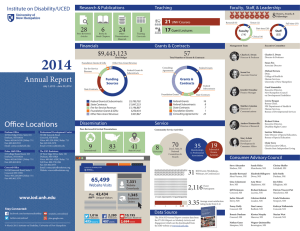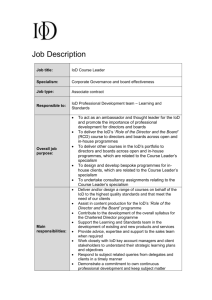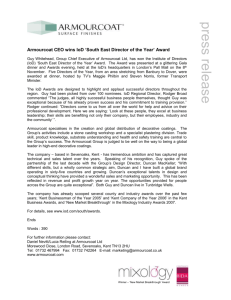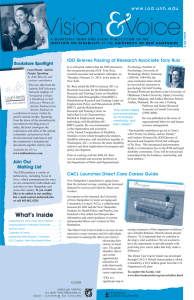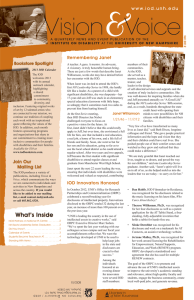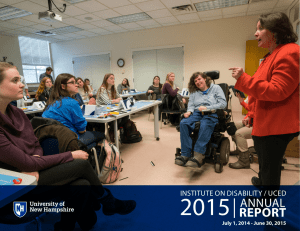IOD Appoints Associate Director Bookstore Spotlight
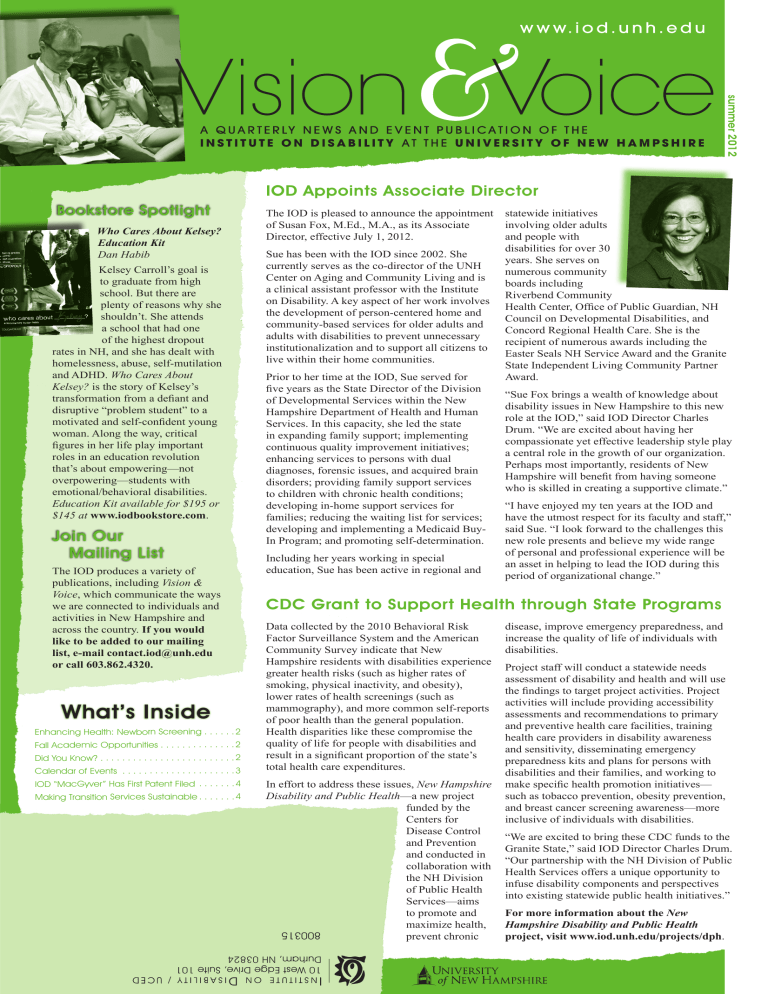
Bookstore Spotlight
Who Cares About Kelsey?
Education Kit
Dan Habib
Kelsey Carroll’s goal is to graduate from high school. But there are plenty of reasons why she shouldn’t. She attends a school that had one of the highest dropout rates in NH, and she has dealt with homelessness, abuse, self-mutilation and ADHD. Who Cares About
Kelsey?
is the story of Kelsey’s transformation from a defiant and disruptive “problem student” to a motivated and self-confident young woman. Along the way, critical figures in her life play important roles in an education revolution that’s about empowering—not overpowering—students with emotional/behavioral disabilities.
Education Kit available for $195 or
$145 at www.iodbookstore.com
.
Join Our
Mailing List
The IOD produces a variety of publications, including Vision &
Voice , which communicate the ways we are connected to individuals and activities in New Hampshire and across the country. If you would like to be added to our mailing list, e-mail contact.iod@unh.edu or call 603.862.4320.
What’s Inside
Enhancing Health: Newborn Screening . . . . . .2
Fall Academic Opportunities . . . . . . . . . . . . . .2
Did You Know? . . . . . . . . . . . . . . . . . . . . . . . . .2
Calendar of Events . . . . . . . . . . . . . . . . . . . . .3
IOD “MacGyver” Has First Patent Filed . . . . . . .4
Making Transition Services Sustainable . . . . . . .4
, Suite 101
IOD Appoints Associate Director
The IOD is pleased to announce the appointment of Susan Fox, M.Ed., M.A., as its Associate
Director, effective July 1, 2012.
Sue has been with the IOD since 2002. She currently serves as the co-director of the UNH
Center on Aging and Community Living and is a clinical assistant professor with the Institute on Disability. A key aspect of her work involves the development of person-centered home and community-based services for older adults and adults with disabilities to prevent unnecessary institutionalization and to support all citizens to live within their home communities.
Prior to her time at the IOD, Sue served for five years as the State Director of the Division of Developmental Services within the New
Hampshire Department of Health and Human
Services. In this capacity, she led the state in expanding family support; implementing continuous quality improvement initiatives; enhancing services to persons with dual diagnoses, forensic issues, and acquired brain disorders; providing family support services to children with chronic health conditions; developing in-home support services for families; reducing the waiting list for services; developing and implementing a Medicaid Buy-
In Program; and promoting self-determination.
Including her years working in special education, Sue has been active in regional and statewide initiatives involving older adults and people with disabilities for over 30 years. She serves on numerous community boards including
Riverbend Community
Health Center, Office of Public Guardian, NH
Council on Developmental Disabilities, and
Concord Regional Health Care. She is the recipient of numerous awards including the
Easter Seals NH Service Award and the Granite
State Independent Living Community Partner
Award.
“Sue Fox brings a wealth of knowledge about disability issues in New Hampshire to this new role at the IOD,” said IOD Director Charles
Drum. “We are excited about having her compassionate yet effective leadership style play a central role in the growth of our organization.
Perhaps most importantly, residents of New
Hampshire will benefit from having someone who is skilled in creating a supportive climate.”
“I have enjoyed my ten years at the IOD and have the utmost respect for its faculty and staff,” said Sue. “I look forward to the challenges this new role presents and believe my wide range of personal and professional experience will be an asset in helping to lead the IOD during this period of organizational change.”
CDC Grant to Support Health through State Programs
Data collected by the 2010 Behavioral Risk
Factor Surveillance System and the American
Community Survey indicate that New
Hampshire residents with disabilities experience greater health risks (such as higher rates of smoking, physical inactivity, and obesity), lower rates of health screenings (such as mammography), and more common self-reports of poor health than the general population.
Health disparities like these compromise the quality of life for people with disabilities and result in a significant proportion of the state’s total health care expenditures.
In effort to address these issues, New Hampshire
Disability and Public Health —a new project funded by the
Centers for
Disease Control and Prevention and conducted in collaboration with
800315 the NH Division of Public Health
Services—aims to promote and maximize health, prevent chronic
Durham, NH 03824
10 West Edge Drive disease, improve emergency preparedness, and increase the quality of life of individuals with disabilities.
Project staff will conduct a statewide needs assessment of disability and health and will use the findings to target project activities. Project activities will include providing accessibility assessments and recommendations to primary and preventive health care facilities, training health care providers in disability awareness and sensitivity, disseminating emergency preparedness kits and plans for persons with disabilities and their families, and working to make specific health promotion initiatives— such as tobacco prevention, obesity prevention, and breast cancer screening awareness—more inclusive of individuals with disabilities.
“We are excited to bring these CDC funds to the
Granite State,” said IOD Director Charles Drum.
“Our partnership with the NH Division of Public
Health Services offers a unique opportunity to infuse disability components and perspectives into existing statewide public health initiatives.”
For more information about the New
Hampshire Disability and Public Health project, visit www.iod.unh.edu/projects/dph .
Fall Academic
Opportunities
As students return to campus for the fall semester, several IOD staff are gearing up to teach at the University of New Hampshire. Therese
Willkomm, Ph.D., is teaching
“Assistive Technology and Sensory,
Communication, and Cognitive
Impairments,” an occupational therapy course for undergraduate or graduate students that provides an overview of assistive technology solutions to support individuals who experience communication, vision, hearing, or cognitive impairments in only four
Saturday sessions. Betsy Humphreys,
M.Ed., is teaching “Special Topics in Neurodevelopmental and Related
Disabilities,” a graduate seminar in health and human services associated with the NH LEND program and a course which incorporates distance learning technology to include students remotely at the University of Maine.
Rae Sonnenmeier, Ph.D., and Amy
Frechette, A.S., are co-teaching
“Autism Spectrum Disorders,” a graduate course in communication sciences and disorders which will discuss evidence-based practices related to autism across the lifespan.
For more information on these courses, visit www.iod.unh.edu
.
2
Did You Know?
According to 2012 data from the New
Hampshire Public
Mental Health
Consumer Survey, more than twothirds (68%) of new adult consumers of mental health services from New Hampshire’s 10
Community Mental Health Centers waited one month or more to have an appointment with a psychiatrist or nurse practitioner.
That means that fewer than one in three individuals ages 18 or older who sought mental health services at a state center as a new patient received them in the same month that they were referred or made an appointment.
For more statistics on consumer experiences with New Hampshire’s mental health service system, visit www.iod.unh.edu/pmhs .
Feed
back
Have a comment, suggestion, or story idea? We value your input.
E-mail contact.iod@unh.edu
or call 603.862.4320
to let us know how we’re doing and how we can better serve you.
Share the IOD with a friend:
Please let friends or colleagues know about us. Pass us along!
Enhancing Health through Newborn CCHD Screening
For infants born with Critical Congenital Heart
Disease/Defects (CCHD), early diagnosis and treatment are key to supporting long-term health, and screening for CCHD as part of newborn genetic screening plays an essential role in the diagnostic process. In New England, implementing CCHD screening as part of regular newborn screening is particularly challenging for several reasons, including staffing limitations at public health agencies and birthing facilities to maintain new programs; lack of education for healthcare providers and families; and wide geographic distribution of birthing facilities, the pediatric specialists providing services, and the families receiving services.
In order to address these challenges, the New
England CCHD Newborn Screening Project , an IOD project affiliated with the New
England Genetics Collaborative (NEGC), aims to enhance existing connections among state public health departments and birthing facilities, and to share resources and expertise in developing CCHD newborn screening protocols, educational materials, programs, and evaluation in Maine, New Hampshire, Vermont, Rhode
Island, and Connecticut. Further, these resources will be used to ensure that families have access to critical diagnostic and treatment services, regardless of how far away they live from major cities in the region.
As part of this project, each of the five state public health departments will establish roles for collecting screening data, monitoring and quality assurance of screening, and incorporating screening results into existing registries. The project is also working with nine regional birthing facilities: Catholic
Medical Center, Manchester, NH; Concord
Hospital, Concord, NH; Dartmouth-Hitchcock
Medical Center, Lebanon, NH; Elliot Hospital,
“We have a unique opportunity to support the development, dissemination, and validation of screening protocols and infrastructure specific to CCHD…”
“We have a unique opportunity to support the development, dissemination, and validation of screening protocols and infrastructure specific to CCHD, and we’re excited to collaborate with our New England partners,” said Monica
McClain, project director.
The New England CCHD Newborn Screening
Project is funded by a three-year, $900,000 grant from the U.S. Department of Health and
Human Services, Health Resources and Services
Administration.
Manchester, NH; Hartford
Hospital, Hartford, CT; Maine
Medical Center, Portland, ME and affiliated sites; Wentworth-
Douglas Hospital, Dover, NH;
Women & Infants Hospital,
Providence, RI; and Yale-New
Haven Hospital, New Haven,
CT. The birthing facilities will conduct CCHD screening as part of their current newborn screening programs and report results.
For more information, visit www.iod.unh.edu
.
Highlighting IOD Donors
Online Funding Campaign for Who Cares
About Kelsey?
This past June, Dan Habib, the IOD’s filmmaker-in-residence, launched an online campaign through Kickstarter to raise awareness and funds for his new film and education project Who Cares About Kelsey?
.
The film includes a 76-minute feature length documentary plus mini-films and extras that document the lives of students with emotional/ behavioral challenges.
Kickstarter, the world’s largest funding platform for creative projects, uses an “all-or-nothing” funding model—if the funding goal is not met by the deadline set by the project’s creator, the project does not receive funds. Habib set a goal of raising $20,000 to support project activities. Although it took several weeks for the campaign to build momentum, the outpouring of support was evident. During the 57 days that the campaign was running, 184 backers pledged a total of $20,317.
Funds raised from the campaign will support:
• Free dissemination of Who Cares About
Kelsey?
Education Kits to schools and nonprofits in low-income communities around the country.
• Film subject Kelsey Carroll’s participation in screenings of the film across the country.
• Post-production for the mini-films, including closed captioning.
• The Who Cares About Kelsey?
national outreach and engagement campaign to support and include students with emotional and behavioral disabilities in school and community.
• Expansion of educational content on the new
Who Cares About Kelsey?
website: www.whocaresaboutkelsey.com.
In addition to helping support the important work of the project, Kickstarter “backers” will receive rewards, such as a special edition of the individual use Who Cares About Kelsey?
DVD
(not available to the public until Summer 2013) and photography prints of some of Habib’s work from his career as an award-winning photojournalist.
In a final Kickstarter update sent to backers,
Habib wrote, “I am honored by this outpouring of grassroots support from longtime friends and family members, new acquaintances, and even folks I have never connected with before. You have shown that you believe in the power of documentary film as a catalyst for improving our educational system and the lives of children and families.”
Thanks to everyone—staff and backers—who made the Who Cares About Kelsey?
Kickstarter campaign a success!
To learn more about making a tax-deductible gift to the IOD, please contact:
Mary Schuh, Ph.D. – Director of
Development and Consumer Affairs
Institute on Disability / UCED
56 Old Suncook Road, Suite 2
Concord, NH 03301
603.228.2084 | mary.schuh@unh.edu
or visit www.iod.unh.edu for easy and secure online donation.
Employment Consulting and
Workplace Support: Application for
Online Training
This online mini-course teaches employment specialists, job coaches, and other employment staff to assist employees with disabilities to succeed in community jobs. Participants learn to identify and enlist natural company resources for training and support, to adopt a consultant approach, and to effectively include an employee in the culture of the workplace. The course will be conducted online for a four-week period.
Application Deadline:
September 14, 2012
Acceptance Notification:
September 21, 2012
Training Dates:
Week 1: September 24-28, 2012
Week 2: October 1-5, 2012
Week 3: October 8-12, 2012
Week 4: October 15-19, 2012
Cost: $35 fee required at time of application; if you are not accepted your fee will be refunded
Presenters: David Hagner, Ph.D., and
Bryan Dague, Ed.D.
Open Forums on Early Developmental
Screening
Participants will learn about national guidelines, successful strategies by local primary care physicians, and opportunities for partnership with community-based early childhood providers. Participants will learn about the use of validated, standardized screening tools such as the Ages and
Stages Questionnaires (ASQ-3) and the
Modified Checklist for Autism in Toddlers
(MCHAT). An overview of the Centers for
Disease Control and Prevention’s Autism
Case-based Training Curriculum will be provided. Participants will also have the opportunity to engage in problem solving and networking activities.
Continuing Medical Education credits will be offered.
Dates & Locations:
September 25, 2012 – Androscoggin
Valley Hospital, Berlin, NH
October 23, 2012 – SERESC, Bedford, NH
Time: 8am – 4pm
Cost: $35 for professionals; $25 for family members (scholarships available)
Presenters: Greg Prazar, MD; Jenny
Lipfert, MD; Nina Sand-Loud, MD; Skip
Devito, MD; Pat McLean, RN, M.Ed.;
Erik Shessler, MD; Melissa Willis; Jackie
Sparks; Liz Collins, RN-BC, M.S.; Sharon
Kaiser; Betsy Humphreys, M.Ed.; Rae
Sonnenmeier, Ph.D.; and Jenn Pineo
RENEW Facilitator Training Institute
This three-day institute will provide indepth training on the Rehabilitation for Empowerment, Natural supports,
Education, and Work (RENEW) model and process. Through group activities and instruction, participants will learn to engage youth in the process, facilitate personal futures planning through mapping, develop individualized and youth-specific resources, direct the
RENEW team process, conduct schoolto-career planning, and empower youth to lead the process.
Dates & Location: September 26,
October 3, and November 7, 2012 –
IOD Professional Development Center,
Concord, NH
*Attendance at all 3 sessions is required.
Time: 8:30am – 3pm
Cost: $400
Presenters: Jonathon Drake, MSW and
Heidi Cloutier, MSW
November 26, 2012 – iPad 101
Presenter: Cynthia Yetman
December 5, 2012 – Reading, Writing,
and Arithmetic Apps
Presenter: Diana Petschauer
January 16, 2013 – 101 Uses for the iPad
Camera
Presenter: Therese Willkomm
February 4, 2013 – Social Stories and
Visual Schedules
Presenter: Phyllis Watson
March 4, 2013 – Video Modeling
Presenter: Phyllis Watson
April 3, 2013 – iPad Apps for Students
with Visual Impairments
Presenter: Diana Petschauer
May 1, 2013 – Using iPad Apps to Foster
Specific Developmental Skills in Young
Children
Presenter: Shannon Fitch
Time: 4pm – 6pm
Location: IOD Professional Development
Center, Concord, NH
Cost: $59 each
Introductory Training for Facilitated
Communication
Participants will learn about Facilitated
Communication (FC), a method of augmentative and alternative communication (AAC) used by people with limited speaking abilities and motor planning challenges. Topics covered will include the history of FC, understanding the method and misconceptions about it, basic elements of the FC technique, determining who might benefit from the method, and a review of current research and best practices.
Date & Location: October 10, 2012 –
IOD Professional Development Center,
Concord, NH
Time: 9am – 3:30pm
Cost: $125
Presenter: Pascal Cheng, M.Ed., C.A.S.
Navigating Choice and Change in Later Life: Frameworks for
Implementing Person-Centered
Planning
Person-centered planning is a unique, individually focused approach to planning for persons who are in need of services and supports. This workshop offers an introduction to personcentered planning for adults, including an overview of what we mean by a person-centered system of care.
Participants will learn about the Drexler/
Sibbet Team Performance™ Model as a framework for conducting personcentered planning. Information on how to facilitate person-centered planning meetings and tools to use in the planning process will also be presented.
Date & Location: November 1, 2012 –
IOD Professional Development Center,
Concord, NH
Time: 9am – 3:30pm
Cost:
Presenters: Susan Fox, M.Ed., M.A., and
Patty Cotton, M.Ed.
iPad After-School Discovery Series: New
Tools and Techniques for the Inclusive
Classroom
The iPad is changing the classroom— bringing hands-on, creative learning opportunities to all students, especially students with disabilities. Its accessibility, reasonable cost, and plethora of available applications make it an incredible resource for both students and teachers. Join us for these twohour afternoon sessions and discover the basics of how to operate your iPad, new techniques to engage students in interactive learning, and a world of powerful apps to support individuals with disabilities.
Dates & Topics:
October 22, 2012 – iPad 101
Presenter: Cynthia Yetman
Save the Date
2012 Annual Compendium of Disability
Statistics and Research-to-Policy
Roundtable
Date: November 28, 2012
Location: Capitol area, Washington, DC
Living Well in our Communities: Thriving as We Age
Date: May 7, 2013
Location: Grappone Conference
Center, Concord, NH
3
For more information and to register, visit www.iod.unh.edu
or call 603.228.2084
IOD Leadership
Charles E. Drum, MPA, JD, Ph.D. – Director
Susan Fox, M.Ed., MA – Associate Director
Linda Bimbo, MS – Interim Director of Finance
& Human Resources
Matthew Gianino, BA – Director of
Communications
Andrew Houtenville, Ph.D. – Director of
Research
Mary C. Schuh, Ph.D. – Director of
Development & Consumer Affairs
Executive Committee
Carol Stamatakis – Executive Director
New Hampshire Developmental
Disabilities Council www.nhddc.org
Matthew Ertas – Bureau Chief
Bureau of Developmental Services
New Hampshire Department of Health
and Human Services www.dhhs.state.nh.us/DHHS/BDS
Neil B. Vroman, Ph.D. – Interim Dean
College of Health and Human Services
University of New Hampshire www.chhs.unh.edu
Santina Thibedeau – State Director of
Special Education
New Hampshire Department of Education www.ed.state.nh.us
Richard Cohen, JD – Executive Director
Disabilities Rights Center www.drcnh.org
UCED Partners
Tom Bunnell, JD – Director
Institute for Health, Law and Ethics
Franklin Pierce Law Center www.fplc.edu
John Moeschler, MD – Program Director
Dartmouth Center for Genetics and Child
Development
Dartmouth Hitchcock Medical Center www.dhmc.org
4
Consumer Advisory Council
Gina Colantuoni – Bow, NH
Jeff Dickenson – Concord, NH
Bonnie Dunham – Concord, NH
Jackie Driscoll – Derry, NH
Nathan Gams – Hampton, NH
Sandy Hicks – Manchester, NH
Beth Hillsgrove – Dover, NH
Amy Howe – Hopkinton, NH
Cabrinni Kulish – Loudon, NH
Dan Louney – Bedford, NH
Kirsten Murphy – Hanover, NH
Mary Schuh – Concord, NH
Chrissy Shaffer – Litchfield, NH
Julie Smith – Durham, NH
Jim Tobin – Effingham, NH
Pat Vincent-Piet – Concord, NH
Kathryn Wallenstein – Concord, NH
Marian West – Concord, NH
Support the IOD!
As a community oriented nonprofit focused on ensuring that equal opportunities and a satisfying quality of life are accessible to all persons, we rely on the generosity of supporters like you to help further the mission of the IOD. If you would like to contribute to the IOD, tax-deductible donations can be made:
Online www.iod.unh.edu
56 Old Suncook Road, Suite 2
Concord, NH 03301
Phone
603.228.2084
An IOD staff member will assist you with the process and answer any questions you may have about your contribution .
IOD “MacGyver” Has First Patent Application Filed
In February 2012, IOD staff member Therese
Willkomm was brainstorming a way that she could create a multi-purpose presentation stand for her iPad. It had to be flexible, simple to reposition, and completely portable so she could transport it easily. Calling on over 25 years’ experience in assistive technology services,
Therese—often referred to as “The MacGyver of Assistive Technology”— went right to work, ordering parts and fabricating a solution to meet her needs. Little did she know just how useful her new creation would be.
Shortly after fabricating a prototype, Therese approached the Office for Research Partnerships and Commercialization (ORPC) at the
University of New Hampshire about filing a patent application for her design. After several discussions and a few design tweaks over the next several months, ORPC filed a design patent application with the U.S. Patent and Trademark
Office in July. If the design proves to be unique, a patent can be issued in as quickly as one year
(other patent classes take three to four years).
Therese’s patent-pending invention, called the
“AT Tablet Stand,” is a portable and completely flexible tablet stand that provides a handsfree solution for educators, cooks, musicians, counselors, therapists, and individuals who experience various disabilities. The stand allows tablets to be positioned at any height, angle, or distance using flexible center tubing and two swivel mounting plates. Additionally, with its non-slip base, the stand offers stabilization for recording images and videos, or using it as a magnification aid or communication device.
The AT Tablet
Stand isn’t just for tablets, though. Using additional snapon accessories, it can be used as an adjustable book or document holder, cup holder, switch mount, keyboard holder, a stand
Therese uses her AT
Tablet Stand to present a workshop during a summer conference for other tablets, and much more. “I am really excited about the hundreds of solutions that this stand provides, not only for individuals with disabilities, but for everyone who will use it,” said Therese.
“Therese’s innovation is a perfect example of how creativity and intellectual property can work together to improve people’s lives,” said
Timothy Willis, ORPC licensing associate. “End users get the product, Therese gets constant feedback for her work, and UNH receives the dual benefit of royalty income and seeing our intellectual assets reach the market. Everyone wins.”
For more information about the AT Tablet
Stand, email maryann.allsop@unh.edu. To inquire about third-party licensing or the design, email timothy.willis@unh.edu
.
Making Autism Transition Services Sustainable
Youth with autism spectrum disorders (ASD) are experiencing more positive transitions from high school to adult life thanks to the work of the Family-Centered Transition Project
(FCTP), a collaboration between the IOD and the University of Maine. The project, which concluded its first phase of activity last August, ultimately served a total of 47 students with
ASD ages 16-18 and their families from New
Hampshire and Maine.
for the future, self-determination, and vocational decision-making ability.
“FCTP has been proven effective and results in good transition outcomes,” said David Hagner, project director. “About 90% of the students who participated in our first project have obtained employment since graduating from high school.”
Project staff administered standardized surveys to each student and family in order to gauge expectations for the future, self-determination, and vocational decision-making ability. For the next six to eight months following this initial survey, students and families attended trainings about person-centered planning, networking, and how to tap into a variety of adult
“FCTP has been proven effective…about 90% of the students who participated…have obtained employment.” service options and resources. Once trained, they met with a planning facilitator to map out the student’s post-secondary goals. Students received ongoing assistance from the planning facilitator, often investigating education or career options through informational interviews, job shadowing, or work experiences.
At the end of the first year, students and their families were surveyed again. When comparing results, students who received transition services through FCTP had significantly higher student expectations for the future, parent expectations
And thanks to a three-year, $600,000 grant from the National Institute on Disability and
Rehabilitation Research, students with autism from New Hampshire and Maine will continue to benefit from transition services proven effective during the first round of project activities.
In this second phase of the project, the Autism Society of Maine and the Strafford Learning Center
(Somersworth, NH) are working with schools, developmental service agencies, and vocational rehabilitation agencies to redirect and blend existing transition service funding to support FCTP’s process so more students and families can experience positive outcomes.
“We use grant funds to fill in gaps while we work on developing and marketing the service, with the expectation that it will be sustainable after the three-year project is over,” said Hagner.
For more information or to get involved with
FCTP, visit www.iod.unh.edu
.
Stay Connected
For the latest IOD news, follow the Institute on Disability on Facebook and Twitter:

